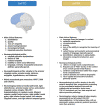Frontotemporal Dementia, Where Do We Stand? A Narrative Review
- PMID: 37511491
- PMCID: PMC10380352
- DOI: 10.3390/ijms241411732
Frontotemporal Dementia, Where Do We Stand? A Narrative Review
Abstract
Frontotemporal dementia (FTD) is a neurodegenerative disease of growing interest, since it accounts for up to 10% of middle-age-onset dementias and entails a social, economic, and emotional burden for the patients and caregivers. It is characterised by a (at least initially) selective degeneration of the frontal and/or temporal lobe, generally leading to behavioural alterations, speech disorders, and psychiatric symptoms. Despite the recent advances, given its extreme heterogeneity, an overview that can bring together all the data currently available is still lacking. Here, we aim to provide a state of the art on the pathogenesis of this disease, starting with established findings and integrating them with more recent ones. In particular, advances in the genetics field will be examined, assessing them in relation to both the clinical manifestations and histopathological findings, as well as considering the link with other diseases, such as amyotrophic lateral sclerosis (ALS). Furthermore, the current diagnostic criteria will be explored, including neuroimaging methods, nuclear medicine investigations, and biomarkers on biological fluids. Of note, the promising information provided by neurophysiological investigations, i.e., electroencephalography and non-invasive brain stimulation techniques, concerning the alterations in brain networks and neurotransmitter systems will be reviewed. Finally, current and experimental therapies will be considered.
Keywords: C9orf72; behavioural variant; biomarkers; frontotemporal dementia (FTD); neurodegenerative dementias; non-Alzheimer’s disease dementias; primary progressive aphasias; tau.
Conflict of interest statement
The authors declare no conflict of interest.
Figures



References
-
- Logroscino G., Piccininni M., Graff C., Hardiman O., Ludolph A.C., Moreno F., Otto M., Remes A.M., Rowe J.B., Seelaar H., et al. Incidence of Syndromes Associated with Frontotemporal Lobar Degeneration in 9 European Countries. JAMA Neurol. 2023;80:279–286. doi: 10.1001/jamaneurol.2022.5128. - DOI - PMC - PubMed
Publication types
MeSH terms
LinkOut - more resources
Full Text Sources
Medical
Miscellaneous

